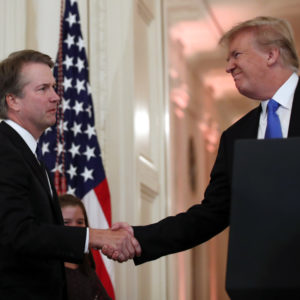WASHINGTON — Foreign observers may be wondering why the case of a teenage boy molesting a teenage girl 36 years ago should sweep other news off American front pages. Koreans, in particular, might want to know why this transgression reaches the same proportions as did their Candlelight Revolution of two years ago when a million or so turned out nightly to protest a regime seen as corrupt and abusive.
Surely, those reading the American newspapers and watching American TV news must be thinking, this ancient fracas on a bed in a Washington suburb cannot have been all that important. Oh, but it is, and was. Just ask some talking head whom I saw and heard on TV saying the sins of a kid named Brett Kavanaugh back in the 1980s will echo through the American psyche for generations. Yes, it might, but not necessarily for the reasons that yakker suggested. The importance of the case lies not in the sin itself but why it merited such a hullaballoo.
The answer reflects the torment of a political elite divided down the middle by those who hate Donald Trump and those who revere him. Not too many of these sagacious politicos are concerned about right or wrong. The Democrats want to “get” Trump, to embarrass him, to take away the slim majority held by the Republicans in both houses of the U.S. Congress in midterm elections coming up in early November. Then they would like dearly to impeach him or at least render him a total lame duck for the remainder of his four-year term.
At the moment Trump’s foes in Congress and the media think there’s no better way to undermine Trump’s presidency than to dig up whatever whiff of scandal or gossip they can find, going back to Kavanaugh’s years at an elite prep school and then at super-elite Yale University. Never mind his editorship on the Yale Law Journal or his 12 years as a federal judge. In the feverish rush of “breaking” news, that record is largely ignored, forgotten or unknown.
The desire to “get” Kavanaugh, and therefore Trump, has sublimated news of attempts at reconciliation on the Korean peninsula. For a few minutes on TV this week, we did hear and see Trump coming out with such honeyed words for Kim Jong-un as to suggest he’s either fallen completely for his wiles or is trying to fool him into thinking he’s really his best friend.
At a political rally, Trump said he and Kim “fell in love” — words commonly used to describe a romantic relationship, not a friendship with the leader of the country that invaded South Korea in June 1950. Trump in his protestation of “love” was referring not only to his summit with Kim in Singapore nearly four months ago but also to what he said were “beautiful letters … great letters” that Kim has written him.
The Trumpster did not reveal the contents of these letters, but some analysts believe that Trump, by engaging in flattery, thinks he can tear down the barriers between the United States and North Korea. Conversely, it’s safe to assume the Kimster is equally convinced of his skills at playing on Trump’s gargantuan ego. So which of these two crazed leaders is likely to come out ahead in their campaign of mutual flattery?
Trump has said he will meet again with Kim in the near future but has given no sign of going beyond the concession already made, cancellation of U.S.-South Korea military exercises. Secretary of State Mike Pompeo is to visit Pyongyang, laying the groundwork for a second Trump-Kim summit. On his fourth trip to the North Korean capital, he hopes to see Kim, who snubbed him during his third trip.
For the benefit of foreign readers who think these events are portentous, let us intrude with a reality check. For more than a few minutes now and then on cable TV, nobody here was paying all that much attention. It was the travail of Brett Kavanaugh that counted, from front-page headlines to analyses, to columns and editorials. Did he or didn’t he? One Yale classmate said she could “nearly guarantee” that he wouldn’t remember a thing about drinking himself into a stupor at an initiation party.
“Nearly guarantee”? Should the senators be asking him what he remembered and who were the witnesses? Oh why not? They were asking about everything else. Besides, the line-ups of yakkers on CNN, Fox and MSNBC were much more fun than boring stories about nukes and bang-bangs in countries that most people would never find on a map.

